Key takeaways:
- Postponements in breakdancing events impact emotional well-being, community connections, and competition dynamics, causing frustration and loss of momentum.
- Reasons for delays include venue issues, health concerns, and scheduling conflicts, each affecting dancers’ motivation and commitment.
- Community responses to postponements vary, with some embracing creativity and virtual connections while others struggle with a sense of loss and disconnection.
- Future event planning should involve community input, strategic scheduling, and effective digital promotion to enhance participation and connection.
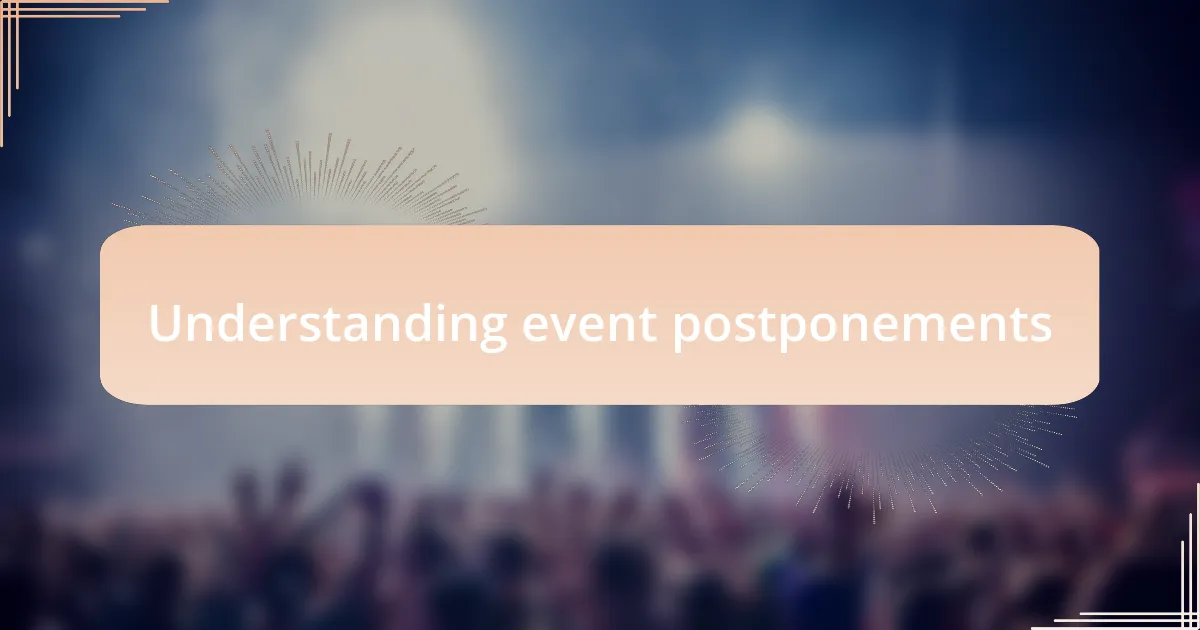
Understanding event postponements
Understanding event postponements can be a complex issue, particularly in a vibrant community like breakdancing. I remember planning a local jam, full of excitement, only to realize that the venue couldn’t accommodate us due to unforeseen circumstances. It hit hard because those moments are not just events; they are where connections are made, and creativity flows.
When we discuss postponements, it often raises questions about emotional investment. How does it feel to wait for something you’ve been looking forward to? I’ve seen friends who start counting down the days only to feel a rush of disappointment when plans change. It’s a reminder of how much we cherish these gatherings and the sense of community they foster.
Furthermore, there are practical considerations that can’t be ignored—rescheduling can mean conflicts with other commitments or even losing momentum in preparation. I recall a time when changing the date felt like rewriting the entire plan. It made me wonder, are we prepared to adapt to these changes, or do we hold on too tightly to our original visions?
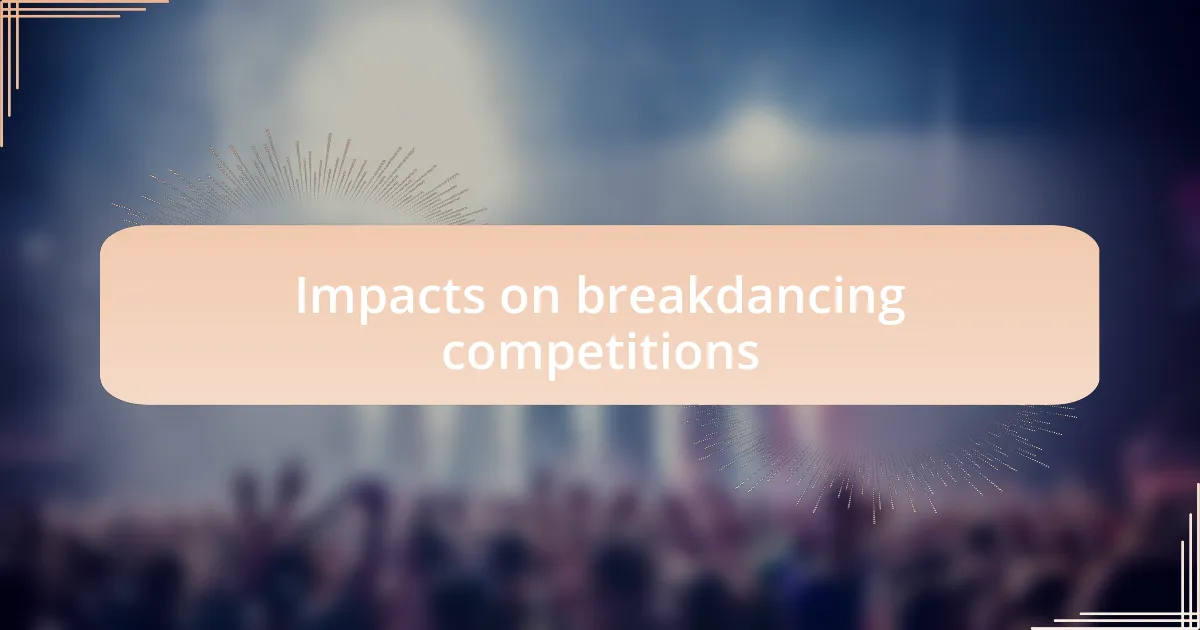
Impacts on breakdancing competitions
The impact of postponing breakdancing competitions can be profound, affecting not just the dancers but also the entire community. I remember when a major regional battle was pushed back, and the anticipation turned into frustration among competitors who had been training hard. It feels like a moment lost, and one can’t help but wonder how the delay might alter the dynamics of the competition itself.
Moreover, rescheduling creates a ripple effect that reaches beyond just the event date. I’ve seen crews that were once fired up start to lose their rhythm as the new date approaches. There’s a certain fire that dims when excitement is deferred; does that passion still translate when the competition finally arrives?
Competition environments thrive on energy and spontaneity, and postponements can disrupt that flow. Recently, a delay led to a shift in the roster, with dancers opting out for other opportunities. It makes me ask: is the essence of breakdancing preserved when the moment we all look forward to gets stretched out on a timeline?
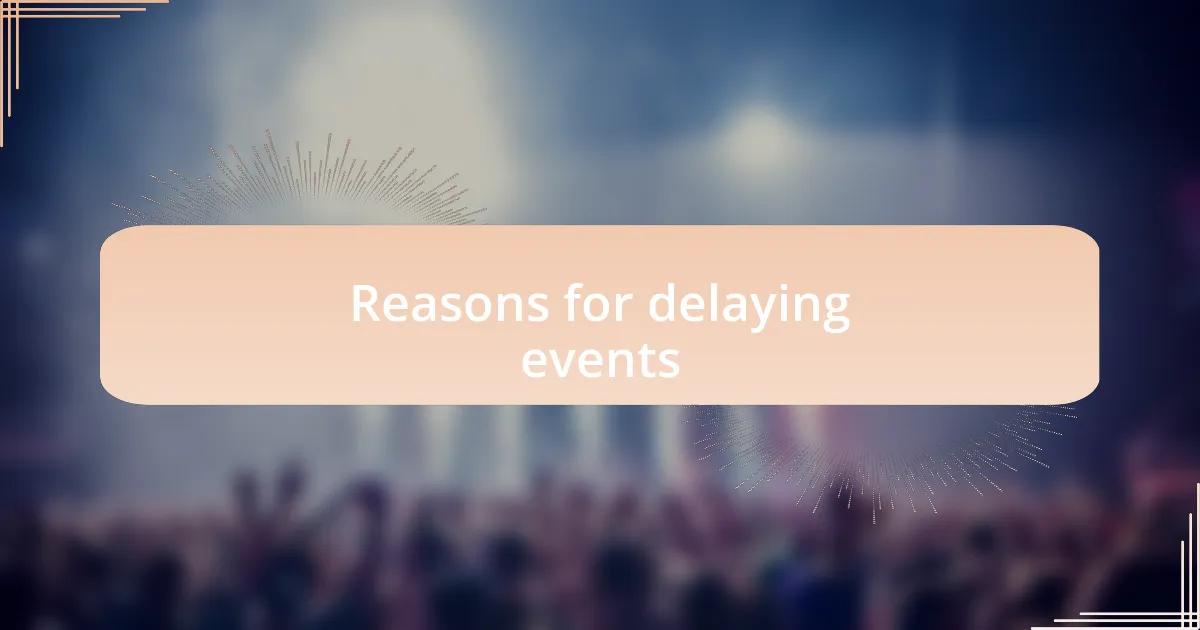
Reasons for delaying events
Postponing events in the breakdancing community can stem from various factors. For instance, I’ve seen competitions delayed due to venue issues; it’s frustrating for everyone involved when the space isn’t ready. I often wonder, how does waiting affect the dancers mentally? The preparation shifts from excitement to uncertainty, leaving many feeling disconnected from their goals.
Another reason for delays is health concerns, particularly in recent times when safety is paramount. I recall a competition where concerns over the spread of illness led to a postponement, and I could almost feel the collective disappointment. It’s essential to prioritize safety, but how do we maintain that vibrant community spirit when gatherings are put on hold? The idea of coming together becomes overshadowed by worry, which can dampen the camaraderie we hold dear.
Lastly, scheduling conflicts often force organizers to delay events. I remember a planned battle clashing with a major festival; it was tough to choose, as both held significant meaning for the community. When events overlap, it creates a dilemma for competitors and supports, raising the question: what are we really willing to sacrifice for the love of dance? Each delay brings unique challenges that can alter the essence of our breakdancing culture.
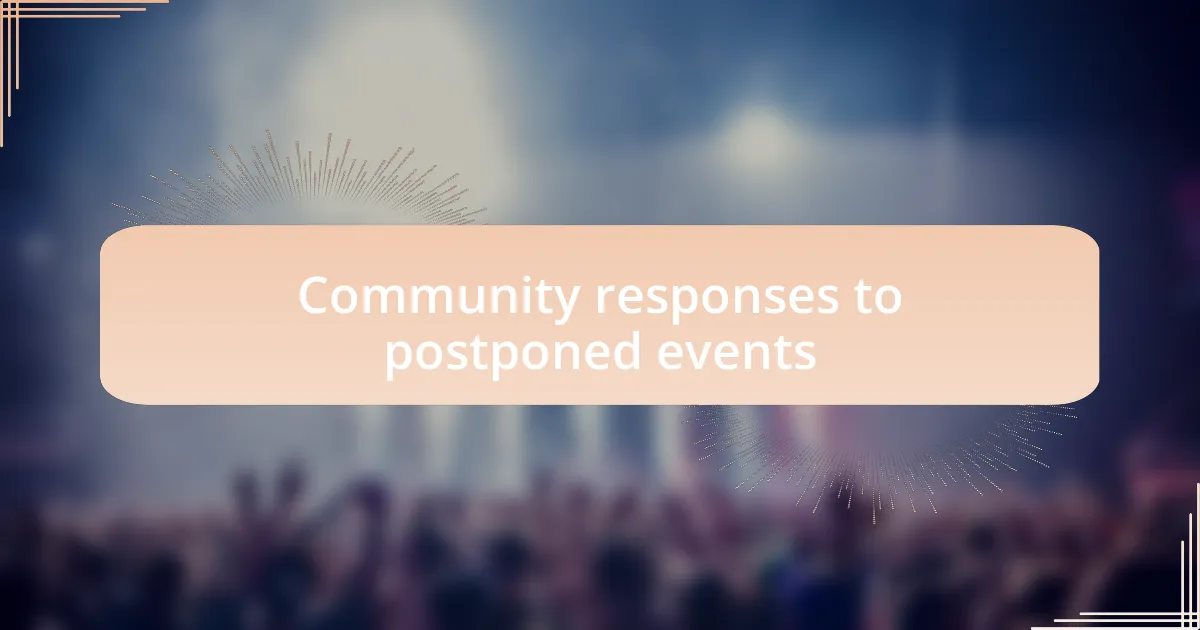
Community responses to postponed events
Community responses to postponed events can vary widely, reflecting the deep emotions tied to breakdancing culture. When a major competition gets delayed, I’ve witnessed a mix of anger, disappointment, and even confusion among dancers. One time, after a postponement was announced, I saw groups of b-boys and b-girls huddled together, exchanging thoughts on what it meant for their training and motivation. It really struck me how intertwined our identities are with these events.
As emotions swirl, some community members channel their frustration into creativity, using the time to refine their skills or collaborate with others virtually. I remember a local crew that decided to organize online sessions, turning their disappointment into productive training hours. It felt like a heartwarming reminder that even in tough times, we can adapt and keep the spirit alive. But I often ask myself: are these temporary fixes enough to sustain our dance community’s morale?
Then there are those who struggle with the uncertainty, feeling lost without the scheduled events to look forward to. I remember chatting with a fellow dancer who expressed how the postponements led to his motivation dwindling; he felt disconnected without the thrill of competition looming ahead. The lingering question remains: how do we foster a sense of belonging and keep the dance floor vibe alive when the beat of events is put on hold?
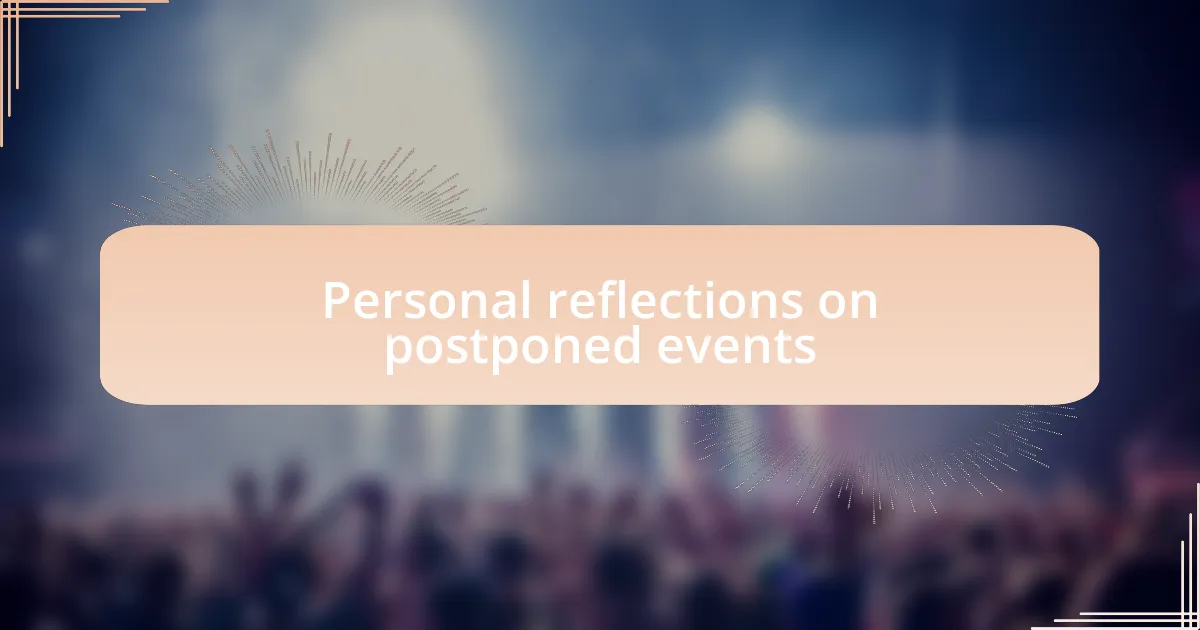
Personal reflections on postponed events
It’s hard not to feel a sense of loss when events are postponed, especially when you’ve poured your heart into preparing for them. I remember training for months for a big local jam, only to have it rescheduled. I found myself staring at my practice space, overwhelmed by a mix of disappointment and restlessness, wondering how to fill the void that competition had created in my routine.
I’ve also seen dancers find solace in their community during these tough times. I stepped into a virtual cypher one evening and felt an instant connection with familiar faces from around the world. Sharing our experiences in that digital space made me realize how important it is to maintain those bonds, even when we can’t be physically together. It raises an interesting question: can virtual connections really replace the energy of a live event?
While some adapt and thrive, others grapple with the sense of stagnation. I’ve had friends who felt their passion wane without events to fuel their fire. I often wonder how we can support one another in reigniting that spark, especially when the dance community is all about shared experiences and collective energy. How do we cultivate motivation in a landscape where the rhythm of events falters?
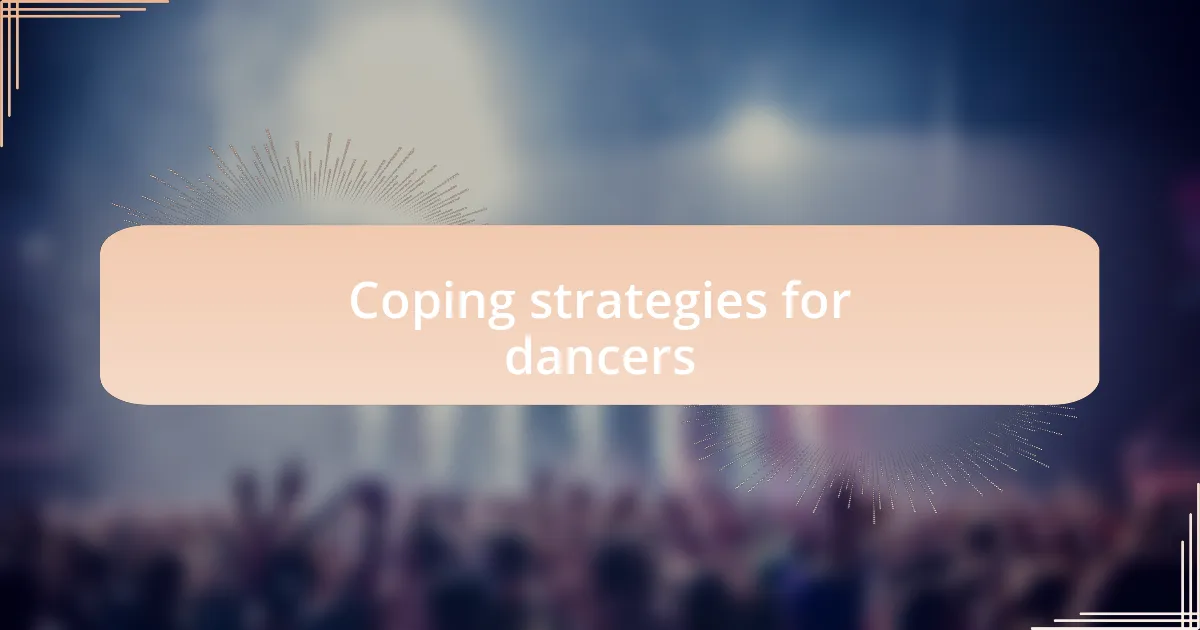
Coping strategies for dancers
Finding ways to cope when events are postponed can be challenging, but I’ve discovered that focusing on personal growth can be incredibly rewarding. When my local jam went on hold, I channeled my energy into honing specific techniques and experimenting with new styles. It was a turning point; instead of feeling defeated, I found passion in the progress I was making, and this renewed sense of joy kept me motivated during uncertain times.
Sometimes, it helps to establish a new routine that replaces the structure of training for an event. I started a weekly video series with friends, where we would showcase our practice sessions and offer feedback. This not only kept us accountable but created a sense of purpose and connection. Isn’t it funny how a simple shift in perspective can transform our experience of waiting?
Another strategy that worked wonders for me was embracing creativity off the dance floor. I took up drawing and even dabbling in music production, which sparked fresh inspiration for my choreography. Engaging in artistry outside of dance opened up new avenues for expression, reminding me that creativity isn’t limited to one medium. What unexpected hobbies might you explore during this downtime that could enrich your dance journey?
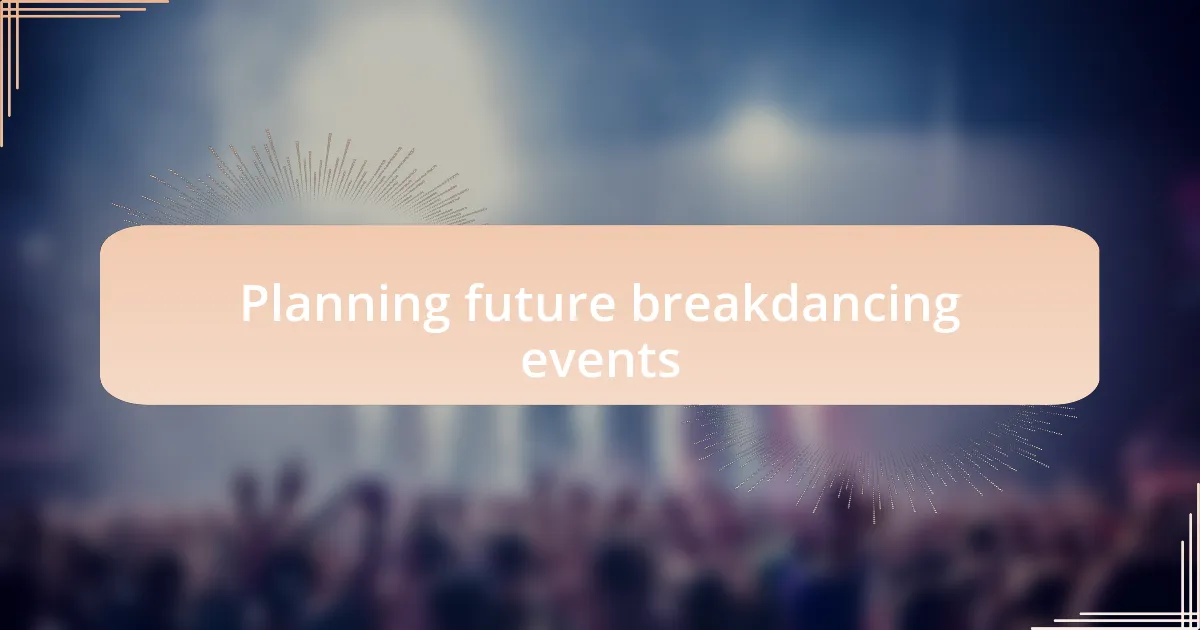
Planning future breakdancing events
When planning future breakdancing events, I believe it’s crucial to engage the community in the decision-making process. Drawing from my experience, I once organized a local jam where each dancer contributed ideas for themes and competitions. The collective input not only created excitement but also fostered a sense of ownership that made the event unforgettable.
As I think about logistics, I realize timing can make or break an event’s success. I’ve learned that scheduling around major holidays or dance competitions can help avoid conflicts that disrupt participation. Once, I hastily planned an event only to find it clashed with a popular championship; the turnout was disappointing. Reflecting on that, I now prioritize checking calendars and balancing personal and community needs.
Digital platforms have become invaluable for planning and promoting these events. I found that using social media not only provided updates but also sparked conversations within the community. During one event, we created a dedicated hashtag that encouraged dancers to share their experiences and set the stage for future gatherings. Have you considered how your online presence could amplify your planning efforts? Engaging in these digital spaces opens up massive possibilities for outreach and connection.